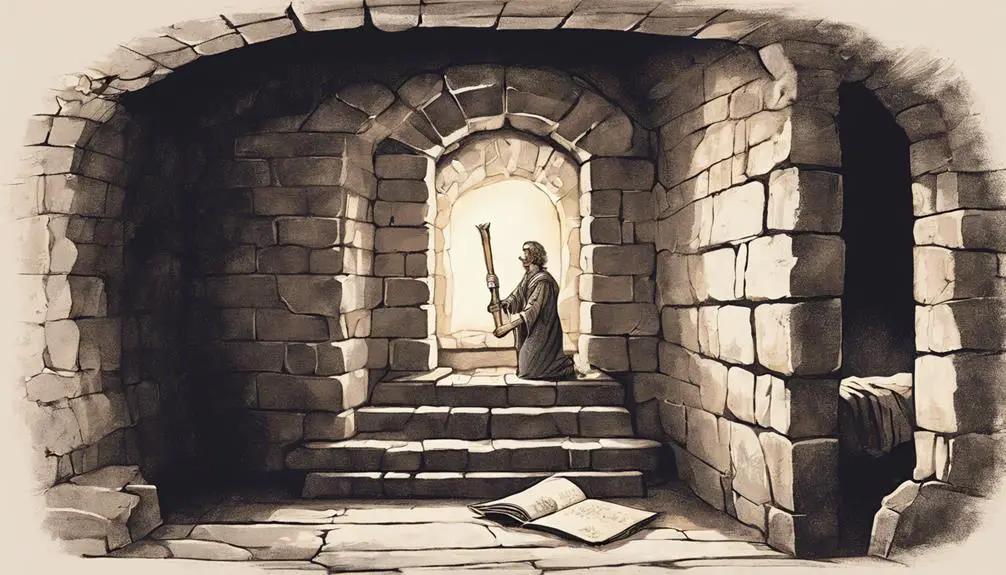Beyond a mere mention, Aristarchus' unwavering loyalty to Paul unveils the depth of early Christian fellowship—discover his untold story.

Aristarchus in the Bible
Navigating the tapestry of early Christian history, you'll stumble upon Aristarchus, a figure whose loyalty to Paul is a thread that weaves through the tumultuous early days of Christianity.
You've likely heard his name in passing, perhaps in a Sunday sermon or a Bible study, but there's more to his story than mere mentions. From his encounter in Ephesus to his unwavering support during Paul's imprisonment, Aristarchus exemplifies devotion in the face of adversity.
If you're intrigued by the resilience and faith of early Christians, Aristarchus' journey alongside Paul offers a compelling chapter in the unfolding narrative of Christianity, one that invites further exploration into how his legacy influences believers today.
Key Takeaways
- Aristarchus was a key figure in early Christianity, deeply influenced by his Jewish-Hellenistic background.
- He played a crucial role in supporting and promoting Christian beliefs alongside Paul.
- His imprisonment highlighted his unwavering loyalty and resilience in the face of adversity.
- Aristarchus's legacy in Christianity emphasizes the importance of faith, dedication, and community support.
Early Life and Background

Aristarchus's early life, shrouded in the mists of history, remains sparingly documented in biblical accounts, offering a glimpse into the cultural and religious milieu that shaped his later contributions. You're invited to consider the scant details of his upbringing within a Jewish heritage, deeply intertwined with Hellenistic influences, a commonality in the Eastern Mediterranean region during this era. This blend of cultural forces likely played a pivotal role in shaping Aristarchus's worldview, making him a product of both Jewish religious traditions and the Hellenistic intellectual legacy that pervaded the region.
His Jewish heritage would have provided him with a strong foundation in the scriptures and the traditions of his ancestors, anchoring him in a community with distinct religious and social practices. This foundation in Jewish culture and law would later inform his actions and decisions, as evidenced in the biblical narratives that mention him. On the other hand, the Hellenistic influences that permeated the territories under Greek control, including his likely place of birth, would have exposed him to a wide range of philosophical, scientific, and artistic achievements of the Hellenistic world.
This dual influence suggests that Aristarchus's upbringing was characterized by a rich tapestry of cultural and intellectual stimuli, preparing him for the complex social and religious challenges he'd encounter in his later life. The interplay between his Jewish heritage and the Hellenistic influences he was exposed to underscores the multifaceted nature of his identity and contributions. This background, though only briefly illuminated in the biblical texts, is crucial for understanding the depth and breadth of Aristarchus's engagement with the early Christian community and the broader socio-cultural context of his time.
Encounter in Ephesus

During his time in Ephesus, Aristarchus encountered pivotal events that significantly influenced his later trajectory within the early Christian community. Ephesus, a cultural and religious hub, presented a unique set of challenges for early Christians, including Aristarchus. The city's deep-rooted pagan beliefs and practices often clashed with the nascent Christian teachings, leading to notable opposition.
Aristarchus's experience in Ephesus is emblematic of the broader struggle between the early Christian movement and the prevailing pagan cultures of the time. This encounter not only tested his faith but also underscored the resilience and adaptability of early Christian followers in the face of adversity. The Ephesus culture, with its emphasis on traditional pagan worship, including the veneration of Artemis, created a volatile environment for Christians, who were often viewed with suspicion and hostility.
The challenges faced by Aristarchus in Ephesus can be summarized as follows:
- Pagan opposition: The strong adherence to paganism among the Ephesians led to direct confrontations, making the propagation of Christian beliefs a risky endeavor.
- Cultural integration: Navigating a path that respected the deeply embedded cultural practices in Ephesus while promoting a fundamentally different set of beliefs required tact and perseverance.
- Community building: Despite the adverse conditions, Aristarchus played a role in fostering a sense of community among the early Christians in Ephesus, laying the groundwork for the spread of Christianity.
The encounter in Ephesus was a defining moment for Aristarchus, highlighting the complexities of spreading Christian teachings in a predominantly pagan world.
Journeys With Paul

Following his significant experiences in Ephesus, Aristarchus embarked on numerous journeys with Paul, which further solidified his role within the early Christian movement. As Paul's companion, Aristarchus's presence during these travels provides critical insights into the travel dynamics and challenges faced by early Christian missionaries. Analyzing these journeys reveals not only the geographical spread of Christianity but also the interpersonal relationships that fueled its expansion.
Aristarchus's role as a traveling companion to Paul was multifaceted. He likely served both as a logistical support and a spiritual confidant. The travel dynamics of the time, fraught with dangers from natural elements, bandits, and political unrest, necessitated a deep trust and reliance among fellow travelers. Aristarchus's continuous presence alongside Paul underscores the mutual respect and essential support system that developed between them. This relationship was instrumental in navigating the complex social and religious landscapes encountered during their missions.
In examining the journeys of Aristarchus with Paul, it's clear that these weren't mere physical travels but profound journeys of faith that tested their resilience, belief, and commitment to spreading the Christian message. Aristarchus's unwavering support of Paul, despite the perils faced, highlights the critical role of companionship and solidarity in the early Christian missionary endeavors. Through these journeys, Aristarchus not only contributed to the foundational work of Christian evangelism but also exemplified the virtues of loyalty, courage, and faith that became hallmarks of early Christian discipleship.
Imprisonment and Loyalty

In the narrative of early Christianity, one can't overlook the profound demonstration of loyalty and the harsh reality of imprisonment faced by Aristarchus, a steadfast companion of Paul. Aristarchus' journey with Paul wasn't just about shared missions or theological discussions; it was also marked by a shared experience of imprisonment, showcasing a level of commitment and faithful resilience that went beyond mere companionship.
Aristarchus' imprisonment alongside Paul isn't just a historical footnote; it serves as a potent symbol of the sacrifices made in the early Christian community. This period of confinement wasn't merely a test of physical endurance but also a profound demonstration of spiritual steadfastness and unwavering loyalty to Paul and, by extension, to the Christian faith. The narrative of Aristarchus underscores the unexpected outcomes that can arise from such deep commitment. His imprisonment, while a symbol of the challenges faced by early Christians, also exemplifies how adversity can forge unbreakable bonds and strengthen the resolve of faith communities.
- Faithful resilience: Aristarchus' ability to endure hardship for the sake of his beliefs and his companion Paul.
- Shared suffering: The shared experience of imprisonment that solidified the bond between Paul and Aristarchus, highlighting the communal aspect of early Christian struggles.
- Unexpected outcomes: The strengthening of communal ties and faith through the adversity faced by Aristarchus and Paul, demonstrating how trials can lead to greater solidarity and conviction within the early Christian community.
Aristarchus' story, then, isn't just one of loyalty and imprisonment; it's a testament to how faith and fellowship can endure and even flourish under the most trying circumstances.
Mentions in Epistles

Building on the narrative of Aristarchus' loyalty and imprisonment, his presence is further illuminated through mentions in the Pauline epistles, which underscore his significant role within the early Christian community. The epistles, a cornerstone of the New Testament, offer a rich tapestry of early Christian life and the individuals who were pivotal to its spread and sustenance. Aristarchus' name, woven into this fabric through Paul's greetings, serves not merely as a nominal mention but as a testament to his contributions and standing among early Christians.
In the epistle to the Colossians, Paul refers to Aristarchus as his fellow prisoner, a term that conveys both a literal and figurative closeness. This mention not only highlights Aristarchus' physical suffering for the faith but also his unwavering commitment to Paul and the Christian message. Similarly, in Philemon, Aristarchus is listed among Paul's fellow workers, a designation that speaks to his active role in the ministry and possibly in the composition or dissemination of Paul's letters. These references, albeit brief, are loaded with implications about Aristarchus' character, his dedication, and his contributions to the early church.
Each mention by Paul, whether in greetings or in acknowledging letter contributions, adds layers to understanding Aristarchus' significance. Far from being mere footnotes, these references invite a deeper exploration of his role and influence in the nascent Christian community. They serve as a bridge, connecting the dots between his personal sacrifices and his broader contributions, thereby painting a fuller picture of his legacy within the early church.
Legacy in Christianity

Aristarchus' enduring influence within Christianity extends far beyond his immediate actions, shaping the faith's development and communal ethos over the centuries. His presence in the New Testament not only serves as historical verification of early Christian figures but also offers rich material for theological interpretations that have resonated with believers across generations.
- Historical Verification: Aristarchus, as mentioned in the Bible, provides tangible evidence of the early Christian community's existence and its integration into the broader socio-political context of the time. This historical grounding is crucial for the faith's authenticity and continuity.
- Theological Interpretations: His story, interwoven with themes of loyalty, sacrifice, and companionship, has been a source of inspiration for theological reflections. It underscores the value of steadfast faith and support within the Christian community, encouraging believers to emulate such virtues in their lives.
- Community Ethos: The narrative of Aristarchus contributes to a communal ethos characterized by resilience, mutual support, and dedication to spreading the Gospel. This ethos has been pivotal in fostering a sense of unity and purpose among Christians, influencing church practices and missionary endeavors.
Aristarchus' legacy in Christianity isn't just a testament to his personal faith and commitment. It's a reflection of how individual stories can embody and propagate the core values and beliefs of a faith tradition. Through historical verification and theological interpretations, his life continues to inspire and shape Christian thought and practice, emphasizing the importance of community, loyalty, and perseverance in the face of adversity.
Frequently Asked Questions
How Do Modern Biblical Scholars Interpret the Significance of Aristarchus's Non-Religious Contributions to the Early Christian Community?
You're exploring how modern scholars view Aristarchus's non-religious roles. They appreciate his astronomy and philanthropic efforts, recognizing their impact on the early Christian community.
His contributions, beyond spiritual guidance, reflect a broader engagement with societal and scientific advancements. Scholars analyze these aspects to understand the multifaceted influence of such figures, highlighting how Aristarchus's work outside religion contributed significantly to the development and enrichment of early Christian society, blending intellectual and charitable pursuits.
Are There Any Archaeological Findings That Have Been Directly Associated With Aristarchus, and What Do They Reveal About the Socio-Political Environment He Lived In?
As you delve into the discussion, it's pivotal to note that no archaeological findings have directly tied to Aristarchus's travels yet. This absence highlights the excavation challenges faced by scholars aiming to unearth evidence of his life and the broader socio-political landscape he navigated.
Such a gap in tangible proof doesn't diminish the intrigue; instead, it amplifies the analytical pursuit to piece together the historical puzzle from scant textual references and indirect archaeological cues.
How Has Aristarchus Been Depicted in Christian Art and Literature Throughout History, and What Does This Reveal About His Perceived Role and Importance?
Exploring how figures are depicted in art and literature offers insights into their significance and roles within historical narratives. When analyzing artistic symbolism and conducting literature analysis, you'll find that portrayal varies, reflecting evolving societal values and cultural perceptions.
This approach illuminates the shifting importance and roles attributed to individuals over time. Such studies reveal not only the aesthetic choices but also the underlying messages intended by artists and authors, enriching our understanding of historical contexts.
What Are the Major Differences in How Eastern Orthodox, Roman Catholic, and Protestant Traditions View and Venerate Aristarchus?
Why does veneration vary so widely?
In examining Aristarchus, you'll find Eastern Orthodox tradition often includes specific liturgical practices and feast days dedicated to him, highlighting his significance.
Roman Catholic acknowledgment might be less pronounced, with fewer liturgical celebrations.
Protestant views typically don't venerate saints in the same way, focusing less on feast days and more on his biblical role.
These differences underscore the nuanced perspectives each tradition holds toward historical biblical figures.
Has the Name Aristarchus, in the Context of Christian History, Been Used in Any Notable Way Outside of Religious Texts, Such as in the Naming of Places or Institutions?
You're exploring how 'Aristarchus' has been used beyond religious texts. Interestingly, it's not just a historical figure but also a name given to significant places.
The Aristarchus observatory and Aristarchus crater are prime examples. These namesakes reflect the broader cultural impact of the name, transcending its biblical origins. They highlight how historical figures can influence various fields, including astronomy, showcasing the interplay between culture, history, and science.
Conclusion
In sum, Aristarchus emerges from the biblical narrative as an unsung hero, whose steadfast loyalty and unyielding support for Paul illuminate the depths of early Christian fellowship. His journey, marked by danger and imprisonment, stands as a testament to an unwavering faith that could move mountains.
Through scant mentions in the epistles, Aristarchus's legacy endures, embodying the spirit of sacrifice and devotion that underpins the Christian ethos. His story, though briefly told, resonates profoundly within the annals of Christian history.



Sign up